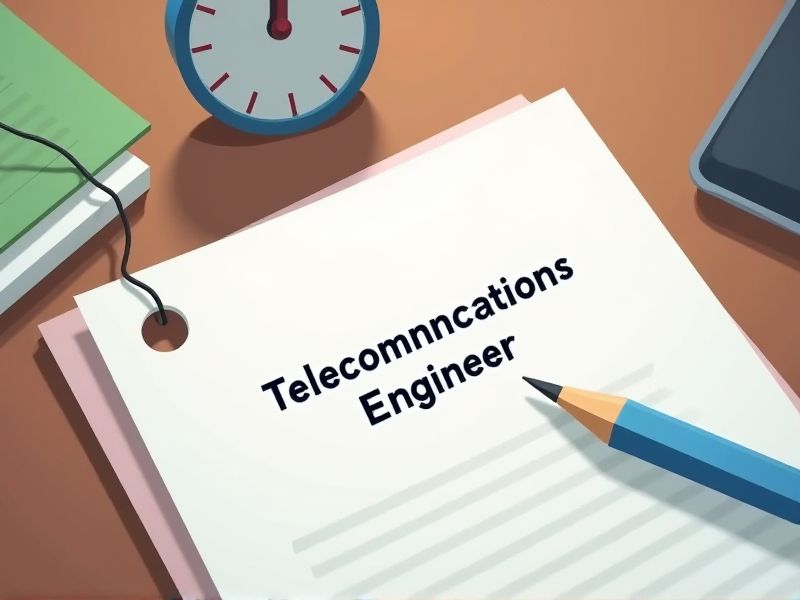
In the rapidly evolving field of telecommunications, staying updated with the latest technologies is crucial for engineers to remain competitive. Certifications provide verifiable proof of an engineer's proficiency in specific areas, such as network management, wireless communication, and cybersecurity. They enhance career prospects by aligning skills with industry standards, ensuring engineers can effectively address complex telecommunication challenges. Here are some key certifications that may be necessary for a Telecommunications Engineer.
Cisco Certified Network Associate (CCNA)
Cisco Certified Network Associate (CCNA) certification establishes a fundamental understanding of networking concepts crucial for any telecommunications engineer. By mastering networking protocols and infrastructure through CCNA, engineers can effectively design, configure, and troubleshoot network systems. Employers often seek CCNA-certified professionals as the certification demonstrates validated skills in managing complex network environments. The consistently updated CCNA curriculum ensures that telecommunications engineers stay abreast of the latest networking technologies and methodologies.
Cisco Certified Network Professional (CCNP)
Obtaining a Cisco Certified Network Professional (CCNP) credential equips a Telecommunications Engineer with advanced networking skills, enhancing their capability to design and troubleshoot complex network infrastructures. Employers prioritize candidates with CCNP due to its rigorous curriculum, ensuring engineers are proficient in implementing optimal and secure network solutions. As telecommunications technology evolves, the expertise garnered through CCNP enables engineers to adapt to new protocols and technologies efficiently. The certification demonstrates a commitment to professional growth, often leading to improved job prospects and potential salary increases in the competitive telecommunications field.
CompTIA Network+
CompTIA Network+ provides telecommunications engineers with fundamental networking skills, which are crucial for designing and maintaining communication systems. The certification ensures engineers understand network infrastructure, which is essential for implementing efficient and secure communication solutions. Telecommunications roles often require troubleshooting expertise, and Network+ covers diagnostic techniques that enhance problem-solving capabilities. Employers value certifications like Network+ as they demonstrate commitment to professional development and up-to-date technical knowledge.
CompTIA Security+
Telecommunications engineers often handle sensitive data and systems, and CompTIA Security+ certification provides foundational cybersecurity skills essential for protecting these assets. The certification covers significant topics like threat management and cryptography, which are crucial for safeguarding communication networks. As cyber threats become more sophisticated, having a validated understanding of security measures ensures telecom engineers can effectively mitigate risks. Companies increasingly require telecom professionals to possess certifications like CompTIA Security+ to comply with industry standards and regulations.
Certified Telecommunications Network Specialist (CTNS)
Certified Telecommunications Network Specialist (CTNS) provides in-depth knowledge on network protocols and architectures, enhancing a Telecommunications Engineer's skill set. This certification ensures engineers understand both legacy and emerging technologies, improving their adaptability in a rapidly evolving field. Employers value CTNS as it demonstrates a commitment to continuous learning and technical expertise. The standardized training from CTNS can lead to more efficient and reliable network design and problem-solving.
Certified Fiber Optic Technician (CFOT)
A Certified Fiber Optic Technician (CFOT) is essential for a Telecommunications Engineer because it ensures that the professional possesses the requisite expertise in fiber optic technology, which is the backbone of modern telecommunications infrastructure. The CFOT certification verifies a technician's capability in installing, testing, and maintaining fiber optic networks, reducing the likelihood of costly errors in network deployments. Telecommunications systems increasingly rely on high-speed data transfer capabilities that fiber optics provide; thus, a trained technician is critical for maintaining network reliability and performance. The certification also enhances an engineer's marketability, providing a competitive edge in a field that demands proficiency in advanced fiber optic systems.
Juniper Networks Certified Associate (JNCIA)
Obtaining a Juniper Networks Certified Associate (JNCIA) certification equips telecommunications engineers with foundational knowledge of Juniper products and network technologies, enhancing their technical skill sets. As telecommunication infrastructures increasingly rely on Juniper's advanced routing solutions, engineers with JNCIA certification are better prepared to implement and troubleshoot these systems effectively. The certification provides formal recognition of an engineer's capabilities, which can improve job prospects and career advancement within the industry. Employers often seek professionals with vendor-specific certifications to ensure they can navigate proprietary systems and provide efficient solutions.
Certified Information Systems Security Professional (CISSP)
Telecommunications engineers often handle sensitive data transmissions, and obtaining a CISSP certification ensures they have advanced knowledge in securing this information. The certification equips engineers with skills to design and maintain robust security systems, vital in preventing data breaches. Telecommunications infrastructure faces numerous cyber threats, and a CISSP credential validates an engineer's expertise in mitigating these risks. The certification is recognized globally, enhancing the engineer's professional credibility and opening more career opportunities in the field.
Certified Wireless Network Professional (CWNP)
Telecommunications engineers need a CWNP certification to enhance their understanding of wireless technologies, as it provides specialized training focused on the intricacies of wireless networking. This certification helps engineers implement and troubleshoot wireless networks more effectively, which is crucial given the increasing reliance on wireless communication. The CWNP credential demonstrates a validated expertise, making engineers more competitive in the job market. The knowledge gained from CWNP equips engineers with the skills to optimize network performance and ensure security across wireless systems.
Certified Voice over IP Professional (CVIP)
Telecommunications engineers benefit from being Certified Voice over IP Professionals (CVIP) because it validates their expertise in deploying and managing VoIP systems, enhancing their credibility in the field. As global communication increasingly relies on internet-based protocols, CVIP certification ensures engineers are equipped with the latest VoIP technologies and techniques. The certification provides structured knowledge that can streamline the integration of VoIP services with existing telecommunication infrastructure, minimizing potential disruptions. With this certification, engineers are better prepared to address and solve complex VoIP-related issues, improving the overall reliability and efficiency of communication networks.
Summary
When you obtain certifications in telecommunications engineering, your professional credibility significantly increases. Employers often perceive certified engineers as more knowledgeable, leading to enhanced career opportunities and potential salary growth. You may also notice improved proficiency in handling advanced technologies and complex systems. Certifications can expand your network by connecting you with other professionals in the field.
